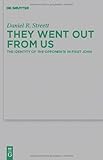 The Biblical notice of Enoch is brief and tantalizing: “When Enoch had lived sixty-five years, he became the father of Methuselah. Enoch walked with God after the birth of Methuselah three hundred years, and had other sons and daughters. Thus all the days of Enoch were three hundred sixty-five years. Enoch walked with God; then he was no more, because God took him.” (NRSV Gen 5:21-24). Several elements here caught later interpreters’ attention.
The Biblical notice of Enoch is brief and tantalizing: “When Enoch had lived sixty-five years, he became the father of Methuselah. Enoch walked with God after the birth of Methuselah three hundred years, and had other sons and daughters. Thus all the days of Enoch were three hundred sixty-five years. Enoch walked with God; then he was no more, because God took him.” (NRSV Gen 5:21-24). Several elements here caught later interpreters’ attention.
- Enoch only lived 365 years–very short compared to the other antediluvians. The number 365 was frequently taken to have calendrical associations, since the solar year is 365 days (well, technically 365.24219647 days 🙂 ). In some traditions Enoch reveals the “true” calendar, typically one that used the sun as its guide.
- Enoch “walked with God.” This was variously interpreted. Some apparently took the elohim (אלהים) not as God, but ‘gods,’ or ‘angels.’ They thus narrated Enoch’s cosmic journeys, guided by angels, wherein he acquired the aforementioned calendrical expertise. Others ttook the phrasing to indicate a righteous life. The LXX is most prominent in this regard, as it reads that Enoch “pleased” God, instead of “walked with” God: εὐηρέστησεν δὲ Ενωχ τῷ θεω. This is the reading cited in Heb 11:5. Targum Onkelos says that “Enoch walked in the fear of the Lord,” while Targum Pseudo-Jonathan says that he “worshipped in truth before the Lord.” Occasionally, traditions will depict Enoch as an example of repentance (Sir 44:16; Philo, Q.G. 1.82).
 Enoch disappeared. In 5:24 the text repeats Enoch’s “walking with God,” after which, he “was not, for he was taken by God.” This is where things get really interesting. Some took this to say that Enoch was “raptured” up into heaven without dying (the same language of “taking” is used of Elijah). Heb 11:5 seems to agree that Enoch did not “see death”: μετετέθη τοῦ μὴ ἰδεῖν θάνατον. In later traditions, he was transformed into a principal angel: Metatron. Other traditions make it clear that he did die. Onkelos, e.g., renders “taken” as “caused to die,” while Pseudo-Jonathan says he died and ascended to heaven. Genesis Rabbah 25 reports a tradition that Enoch was “taken” so early because of his hypocrisy and sinfulness.
Enoch disappeared. In 5:24 the text repeats Enoch’s “walking with God,” after which, he “was not, for he was taken by God.” This is where things get really interesting. Some took this to say that Enoch was “raptured” up into heaven without dying (the same language of “taking” is used of Elijah). Heb 11:5 seems to agree that Enoch did not “see death”: μετετέθη τοῦ μὴ ἰδεῖν θάνατον. In later traditions, he was transformed into a principal angel: Metatron. Other traditions make it clear that he did die. Onkelos, e.g., renders “taken” as “caused to die,” while Pseudo-Jonathan says he died and ascended to heaven. Genesis Rabbah 25 reports a tradition that Enoch was “taken” so early because of his hypocrisy and sinfulness.
So things aren’t very clear. This ambiguity is reflected in the LXX rendering: “he was not found because God translated him” (οὐχ ηὑρίσκετο ὅτι μετέθηκεν αὐτὸν ὁ θεός). The word used here for “translate” (μετατιθημι) is open to multiple interpretations. It could simply mean that Enoch was moved to a different place. Jubilees 4:23 probably reflects this idea, as there Enoch is moved to Eden, where he acts as an eternal priest in the garden-temple (though Jubilees may also indicate Enoch’s death in Jub 7:39, which complicates the picture!).
In some Hellenistic Jewish traditions, though, Enoch’s translation was a transformation (another possible meaning of μετατιθημι). Thus Philo says that Enoch did die (Q.G. 1.85), but that for the righteous death is translation to “into an incorporeal idea,” i.e. a purely spiritual, immortal existence. Thus, although Philo says that Enoch died, in the end, his view of Enoch is quite close to the traditions that have Enoch becoming like the angels. Even more fascinating, Philo says that the same thing happened to Moses. He died, but his body was not found, since God transformed him entirely into an idea/spirit. So also Elijah, whom Philo says was “taken” up to heaven in the sense of being transformed into a spirit/idea, without leaving behind a body.
We find, I think, a similar view in Wisdom of Solomon 4, which describes the righteous one who, though he dies early, is granted rest (4:7). That this “righteous one” is Enoch is made clear in 4:10, which echoes the LXX rendering: “He pleased God, and was loved by him: and when he was living among the sinful he was translated.” εὐάρεστος θεῷ γενόμενος ἠγαπήθη καὶ ζῶν μεταξὺ ἁμαρτωλῶν μετετέθη. Wisdom makes it clear that Enoch died. That is, his transposition (metathesis) and “catching up” (cf. ἡρπάγη, v11) did not preclude death. His death, though, was not a result of his unrighteousness, but of God’s mercy, so that Enoch would not be corrupted by the sinful antediluvians (4:11). [BTW, the NRSV completely obscures the Enoch reference by rendering all the pronouns plural to achieve gender-neutrality]. 4:14 again uses the language of “pleasing God,” while 4:16 perhaps refers to Enoch’s new role as judge.
So, to answer the question in the title of this post, “it’s complicated.” 🙂

If you’re still reading at this point, then you might be nerdy enough to check out some of these great resources on Enoch:


3. The Mystery of God – Rowland and Morray-Jones – examines the influence of Jewish apocalypticism and mysticism on the NT. Has a great chapter on Enoch traditions.

4. Fallen Angels and the History of Judaism and Christianity: The Reception of Enochic Literature – shows how early Christians and Jews used the Enochic literature and the Watcher myth.






My view:
“When Enoch had lived sixty-five years, he became the father of Methuselah. Enoch walked with God after the birth of Methuselah three hundred years, and had other sons and daughters. Thus all the days of Enoch were three hundred sixty-five years. Enoch walked with God; then he was no more, because God took him.” (NRSV Gen 5:21-24)
1) I take is that the key to what happened to Enoch, are the words “then he was no more”.
Why would a writer prefer them and not the words “then He died”? It’s not used anywhere else in Scripture. What person wouldn’t choose the words “then he died” if he believed that Enoch actually died? He is definitely telling us something else here.
2) Twice we are told that “Enoch walked with God”. Wouldn’t it be more harmonious if the writer, instead of saying: “then he was no more” -pointing to a non-existence-, say something like: “then he went to be with God”, again implying that he died but by this choice of words pointing out the continuance of life with God? But no, the writer, goes from Enoch “walking” here on earth with God, to not continuing this walk with him (as we might expect), but to pointing out: “then he was no more”, a term never used again, much less to speak of death! This too, for me implies that he was not writing about Enoch’s death, but transportation from earth to God, to “heaven”.
3) But that’s not all. He doesn’t stop there. And the question that should be asked is: WHY NOT?? Why does he feel he has to explain why Enoch “was no more”?? Please contemplate on this question a little.
Again though, although we would expect him to add something like: “because he died”, he prefers the words “because God took him”. Again, another peculiar choice of words. Maybe someone might ask: Could it be that by saying that “Enoch was no more”, he did actually mean that Enoch died, but because he suddenly felt that that might be misunderstood he explained it by saying: “Because God took Him”? My opinion is no. My reasoning: a) chose the words “then he was no more” to begin with, b) feeling that those words would be misunderstood is reason to remove them(!), not reason to complicate them even more. I mean, he supposedly felt that “then he was no more” may complicate what he was saying in someone’s mind, but he didn’t feel that that he would complicate things even more by adding “because God took him”?? I don’t see it. Especially if take into account the previous point (2).
Now then, **accepting that the writer believes that Enoch did not die**, the words: “then he was no more (or was not)” would have to mean: “then he was no more on earth”. The article mentions the take based on Jubilee 4:23 that Enoch was moved to Eden, but Eden was on earth. Why would he use the words “then he was no more” and not other ones referring somehow to another place on earth?? I mean, He would still be with God in Eden, no? If he was moved to Eden, how could the writer write: “Enoch had lived sixty-five years”, and again: “all the days of Enoch were three hundred sixty-five years”, that is, if he kept on living in Eden.
Thanks for your time.
God bless!
I read up to here because I am interested in comments on the LXX. In order to create the proper environment for my theology, I use a Septuagint for the NT (but without the Apocrypha). I often wonder why NT people, especially those in the “Living Koine Movement” do not lean more on the Septuagint. And yes: I still read it in “diapla” with English in the smaller column. 😉
Pingback: Daniel Streett on “Did Enoch Die? (LXX, Philo, Hebrews)” | The Time Has Been Shortened